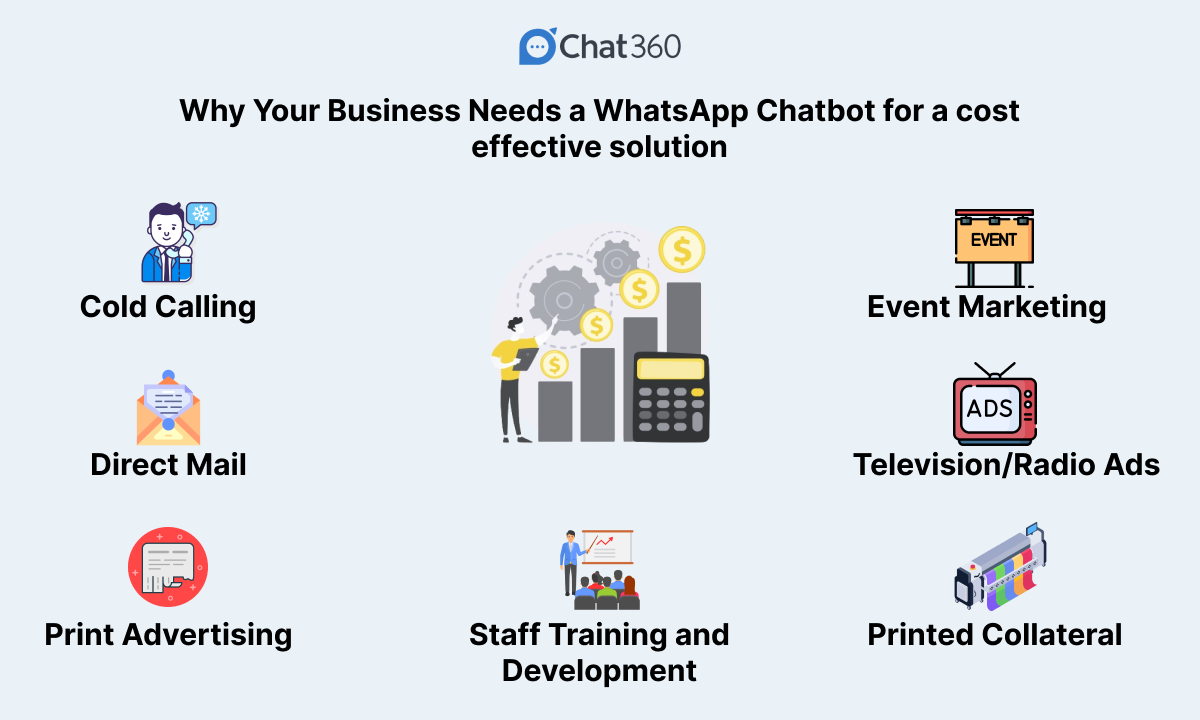Businesses are evolving day by day, maintaining a competitive edge demands a strategic embrace of innovative solutions. These not only optimize operational efficiency but also present compelling cost-effective alternatives for businesses striving to thrive in the digital age.

Conventional lead generation and sales techniques have long been the bedrock of business strategies, each accompanied by its own set of financial commitments. Below are the list of parameters which follow the costs which are associated with the traditional business approaches for sales.
1. Cold Calling Expenses: Engaging a sales team in cold calling demands significant manpower and entails expenses related to phone bills, training, and employee turnover.
2. Direct Mail Costs: Initiating direct mail campaigns involves considerable costs for printing and postage, adding a financial layer to the distribution of physical mailers, brochures, or catalogs.
3. Print Advertising Expenses: Traditional print advertising, whether in newspapers, magazines, or billboards, necessitates a substantial budget. Predicting returns on investment in such campaigns can be challenging, leading to potential financial uncertainties.
4. Event Marketing Investment: Participating in industry events, trade shows, and conferences comes with registration fees, booth setup costs, travel expenses, and promotional material costs. The cumulative investment in event marketing can be substantial.
5. Television and Radio Ad Costs: If businesses choose to engage in television or radio advertising, the expenses associated with producing high-quality commercials and securing airtime can be significant.
6. Printed Collateral Expenses: Beyond the direct costs of print advertising, producing marketing collateral such as brochures, flyers, and promotional materials contributes to the overall expenditure. Design, printing, and distribution expenses all factor into the budget.
7. Staff Training and Development: Ensuring that sales and marketing teams are well-equipped and up-to-date with the latest techniques often requires ongoing training programs. These programs come with associated costs for materials, trainers, and the time investment of the staff involved.
Disadvantages of tracking business outcomes using conventional techniques
While conventional lead generation techniques have demonstrated historical effectiveness, they frequently come with inherent challenges, intricacies, and complexities, making it increasingly difficult for businesses to track outcomes efficiently. The evolving landscape of consumer behaviour, coupled with dynamic market trends, has accentuated the limitations of traditional approaches. The traditional methodologies, rooted in manual processes and conventional tracking mechanisms, often struggle to keep pace with the real-time demands of a modern and digitally-driven marketplace.
The reliance on manual lead tracking and a lack of real-time analytics present formidable barriers. These barriers hinder businesses from promptly adapting to shifting consumer preferences or seizing emerging opportunities. Furthermore, the inability to swiftly attribute leads and sales to specific marketing channels limits the precision required for optimizing resource allocation. As businesses navigate this challenging terrain, the need for a more streamlined and technologically advanced solution becomes evident.
Below are the list of disadvantages of tracking data:
1. Limited Data Insights: Traditional methods often provide limited insights into customer behaviour and preferences, hindering the ability to tailor marketing strategies based on real-time data.
2. Manual Lead Tracking Challenges: Manual tracking of leads and sales outcomes can be time-consuming, error-prone, and susceptible to oversight, leading to missed opportunities.
3. Difficulty in Attribution: Determining the specific source of leads and attributing sales to a particular marketing channel can be challenging, making it harder to optimize resource allocation.
4. Delayed Feedback Loops: Traditional methods often lack the immediacy of feedback loops, making it difficult for businesses to adapt swiftly to changing market conditions or customer preferences.
5. Inefficient Performance Metrics: Conventional techniques may rely on outdated performance metrics, making it harder for businesses to gauge the effectiveness of their strategies in the current competitive landscape.
6. Lack of Personalization: Difficulty in personalizing marketing messages to individual customer preferences can lead to generic campaigns that may not resonate with specific customer segments.
7. Inability to Adapt Quickly: Conventional approaches may lack the agility needed to adapt quickly to emerging trends or shifts in consumer behavior, potentially resulting in missed opportunities.
8. High Dependency on Manual Processes: Reliance on manual processes for lead tracking and analysis can lead to bottlenecks and inefficiencies, hindering the overall productivity of the sales and marketing teams.
9. Data Security Concerns: Handling customer data manually raises concerns about data security, especially with increasing regulations and the need for stringent privacy measures.
10. Resistance to Change: Traditional methods may face resistance from employees accustomed to established processes, making it challenging to implement new technologies or strategies for more efficient tracking.
How technology can help like WhatsApp, for efficient business practices
Technology serves as a catalyst for efficiency and effectiveness in lead generation and sales. WhatsApp, a widely used messaging platform, has emerged as a powerful tool for businesses to connect with customers in real-time and streamline their marketing efforts.
1. Instant Communication: WhatsApp facilitates instant and direct communication with potential customers, allowing businesses to respond promptly to queries, provide information, and nurture leads effectively.
2. Automated Responses: Leveraging technology, businesses can deploy WhatsApp Chatbots to automate responses and engage with customers 24/7. This not only enhances customer experience but also ensures that no lead goes unattended.
3. Multimedia Integration: WhatsApp supports multimedia content, enabling businesses to share images, videos, and documents seamlessly. This feature enhances the engagement level and allows for a more interactive and personalized customer experience.
4. User-Friendly Interfaces: The user-friendly interface of WhatsApp contributes to a positive customer experience. Easy navigation and accessibility enhance customer satisfaction, making it more likely for leads to convert into sales.
5. Chatbot Assistance: Integrating chatbots on WhatsApp enables businesses to provide immediate assistance, answer frequently asked questions, and guide customers through the sales process without requiring constant human intervention.
6. Data Analytics for Insights: Technology-driven analytics tools associated with messaging platforms like WhatsApp offer valuable insights into customer behavior. This data allows businesses to refine their strategies based on real-time feedback and performance metrics.
7. Personalization Opportunities: Technology enables businesses to personalize interactions on WhatsApp, tailoring messages, offers, and promotions based on individual customer preferences and historical interactions.
8. Seamless Integration with CRM: Integration between WhatsApp and Customer Relationship Management (CRM) systems ensures that customer data is synchronized. This seamless connection facilitates a more comprehensive understanding of customer interactions across various touchpoints.
9. Geo-Targeting Capabilities: Utilizing technology on WhatsApp allows businesses to leverage geo-targeting capabilities. This enables them to send location-specific promotions or messages, increasing the relevance of their communications.
10. Cost-Effective Communication: Compared to traditional methods, using technology like WhatsApp for communication is often more cost-effective. It reduces the need for extensive manual efforts, saving both time and resources.
Below is a comparison between Conventional and Technology driven WhatsApp business practices:
| Comparison | Conventional Techniques | |
| Cost of Implementation | Higher upfront investments in infrastructure, manpower, and materials | Relatively lower setup costs, primarily software-based |
| Operational Expenses | Ongoing costs for manual efforts, such as cold calling and print advertising | Reduced operational costs with automated responses and chatbots |
| Scalability | Scaling can be challenging and expensive | Easily scalable without significant additional costs |
| Attribution Challenges | Difficulty in attributing leads and sales to specific marketing channels | Improved attribution through digital tracking and analytics |
| Personalization Efforts | Limited personalization due to manual processes | Enhanced personalization through automated and tailored interactions |
| Real-time Feedback | Delayed feedback loops with traditional methods | Immediate feedback and insights with real-time data analytics |
| Adaptability to Trends | Slower adaptability to emerging trends | Quick adaptation to changing market conditions and customer preferences |
| Data Security | Concerns over data security in manual processes | Enhanced data security with encrypted messaging on digital platforms |
| Training Costs | Ongoing costs for training programs | Minimal ongoing training costs for automated systems |
| 24/7 Availability | Limited availability based on business hours | Round-the-clock availability for customer engagement with automation |
Chat360 can help businesses for Cost-Effective Solutions using WhatsApp Chatbot
Chat360, a leading chatbot provider that offers a comprehensive solution for businesses looking to harness the power of WhatsApp Chatbots for cost-effective lead generation and sales.
1. Multi-Platform Integration: Chat360’s chatbots seamlessly integrate with popular messaging platforms like WhatsApp, Instagram, and Facebook, as well as business websites. This multi-platform approach ensures that businesses can reach their target audience across various channels, maximizing their outreach.
2. CRM Integration: Recognizing the importance of customer relationship management, Chat360’s chatbots can be seamlessly integrated with CRM platforms. This integration allows businesses to consolidate customer data, track interactions, and derive actionable insights for more effective lead nurturing and conversion.
3. Customization and Personalization: Chat360 understands the importance of personalized customer interactions. Their chatbots are highly customizable, allowing businesses to tailor responses, offers, and promotions based on individual customer preferences and behaviors. This level of personalization significantly enhances the chances of successful lead conversion.
4. Round the clock availability: With Chat360’s WhatsApp Chatbots, businesses can ensure round-the-clock availability for customer queries and engagement. This not only improves customer satisfaction but also ensures that no potential lead is lost due to delayed responses.
5. Cost Efficiency: By automating responses and streamlining customer interactions, Chat360’s WhatsApp Chatbots contribute to significant cost savings for businesses. The efficiency and effectiveness of these chatbots translate into a higher return on investment compared to traditional lead generation methods.
The adoption of a WhatsApp Chatbot, especially through a reliable provider like Chat360, can be a game-changer for businesses seeking cost-effective solutions for lead generation and sales.
As we navigate the dynamic landscape of modern business, staying technologically savvy and embracing innovative solutions is not just an option but a strategic necessity. WhatsApp Chatbots offer not only cost savings but also a more efficient and personalized approach to customer engagement, ensuring that your business stays ahead in the competitive market.
Schedule a free demo today!
